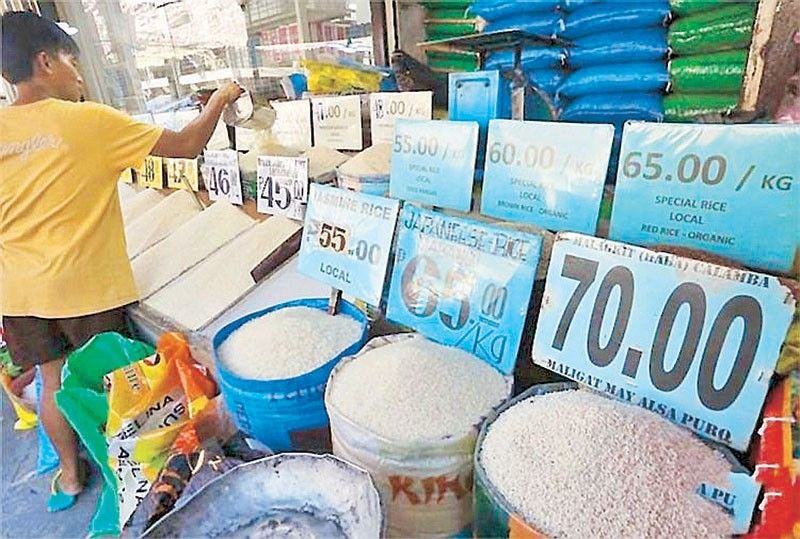NFA in the spotlight anew

As government moves forward with liberalized trade
The open secret
MANILA, Philippines — Aside from the National Food Authority‘s (NFA) scheme of buying high and selling low, pundits have emphasized that the agency has another problem – its sole authority and discretion over the rice industry.
Pre-Rice Tariffication Law (RTL), the agency had the power to allocate import permits among participating traders and importers.
That power, sources said, leaves the bureaucracy prone to corruption. It has been an open secret that rice import licenses and quotas issued by the NFA back then were being sold by smaller importers to bigger players.
The NFA, sources said, could also favor a few in securing these rice import licenses.
Some say that unscrupulous officials at the NFA also made a killing from the rice importation programs that it had undertaken in the past. Sources note that a margin of P1 per kilo of imported rice could mean millions.
That is why under the RTL, the power to oversee rice imports in the country was transferred to the Bureau of Plant Industry (BPI).
The BPI’s lone mandate in relation to rice imports is to ensure that shipments arriving in the country are safe for human and plant health.
It cannot limit the volume and timing of the rice to be imported by private entities. It must not delay the issuance of necessary documents for the importation of rice. It must approve import applications within seven days if applicants have complete documents and requirements.
Today, seeking a license from the NFA is no longer needed to sell rice. Today, the NFA does not have the power to inspect warehouses unlike before. Today, the government does not have a single power to intervene in the market at times of price spikes.
But this is a situation that government officials and legislators are seemingly trying to reverse as the country moves forward with its liberalized rice trade regime.
The warning
In 2019, agriculture stakeholders warned that tinkering with the regulatory and commercial functions of the NFA could leave the government powerless in times of emergency or crisis.
And in the eyes of agriculture officials, that is what is happening now. With rice prices skyrocketing past P55 per kg, the Department of Agriculture (DA) believes that the government must be able to sell rice lower than the prevailing market prices to temper price upticks and hopefully pull them down.
In Agriculture Secretary Francisco Tiu Laurel Jr.’s own words, “dapat puwedeng sumundot.”
Rice price today has been hovering between P55 and P59 per kg as a result of higher prices of staple in the world market caused by India’s export ban of non-Basmati rice.
The DA is pushing for the restoration of certain government powers, most of which previously belonged to the NFA, in regulating the country’s rice industry as part of the deliberations on the amendments to the RTL law.
First, the government must have the commercial powers to sell rice at cheaper prices.
Second, the government must be able to inspect warehouses to determine the country’s rice stock situation and ensure that they are compliant with food safety standards.
Third, the government must be allowed to import rice as a last resort during an emergency or crisis to ensure the country’s supply availability and affordability.
In short, the DA wants to restore the commercial and regulatory powers of the NFA.
“The real intention is not to give full power back to the NFA but use NFA as a conduit to operationalize in certain moments of interventions maybe once or twice a year. But not through the authority of anybody in the NFA,” Tiu Laurel said.
The House of the Representatives adopted the DA’s proposals, taking cognizance of the current market situation following the absence of the NFA.
The sticking point
But the Senators were quick to express their opposition after learning about the proposal to restore the lost powers of the NFA. They are worried that the NFA would return to its debt-ridden and corruption-clouded past.
The Senators, led by Villar, told the DA outright about their apprehensions with the department’s proposal during its recent hear ing on the achievements of the RTL law.
Sen. Imee Marcos was frank about it: nobody trusts NFA anymore – not the farmers and not the senators. But the DA contingent, spearheaded by Tiu Laurel, remained firm in their proposal.
Moments later during the hearing, a seemingly middle ground was within the agriculture officials and senators’ reach. The DA officials said they are amenable to removing the NFA out of the picture as long as the powers that they are seeking – to import rice and sell commercially – be given back to the government, whether it is the DA or even the President himself.
The Senators expressed openness to the idea. They were willing to give those emergency powers as long as NFA is not involved. The Senate is yet to tackle the Senate Bills filed that seek to amend the RTL law.
Rice industry groups, meanwhile, are divided with regards to restoring certain powers of the NFA. Some support it while some don’t. Some economists too opposed bringing back the old powers of the grains agency.
The Federation of Free Farmers (FFF) supports the proposal of expanding the procurement options of the NFA including purchases of rice from local farmers and cooperatives, buying a certain portion of imported rice by private traders at declared import price and direct importation as last resort.
“Lets amend the law so that the NFA would have options when the situation gets worse,” FFF national manager Raul Montemayor said.
“The NFA should have two different buffer stocks for its calamity response and price stabilization purpose. The two stocks should not be mixed to ensure that the NFA would have stocks when there is a calamity,” Montemayor added.
Samahang Industriya ng Agrikultura (SINAG), meanwhile, bucked any proposals that would involve the NFA.
“We’re already allergic to NFA. The NFA should focus on buying from local farmers and in case there are shortages then the powers of the President or the Secretary can be used,” SINAG president Rosendo So said.
Industry sources note that everything feels like a déjà vu of 2019. The government is talking again about rice, NFA and whatnots as the sticking points.
Today, rice prices are still high at P57 per kg.
Only time will tell which version of the amendments would prevail.
In the meantime, Filipinos will have to continue grappling with higher rice prices.
- Latest
- Trending



























